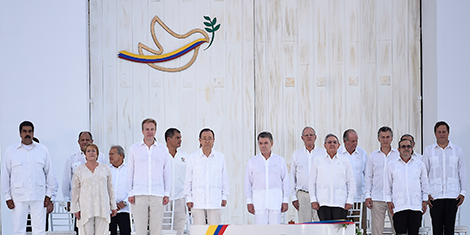
This article was originally published by Political Violence @ a Glance on 28 May 2019.
This fall will mark three years since the Colombian Peace Accord between the government of Juan Manuel Santos and the FARC guerrilla group was ceremoniously signed in Havana, Cuba. It was unique for a variety of reasons: it ended the world’s longest-running civil war, it was signed with the world’s oldest guerrilla group (the FARC), and—what few know—is that it is also the first peace process that explicitly includes economic actors in the truth and accountability mechanisms to help the country transition to peace.
Yet, Colombia faces the challenge of reconciling two competing norms—an accountability norm (specifically, for economic actors) and an economic development norm, so as to ensure the peace experiment sticks. While politicians and former guerrilla leaders are negotiating the implementation of a political peace, policymakers—necessarily—rely on economic elite, some of whom may have been accused of contributing to the conflict, to promote economic development. Business leaders are needed to generate economic growth directly or to serve as conduits for joint ventures to attract foreign direct investment. In short, how can the state hold corporate actors accountable while also helping propel the country forward?
The accountability norm is evident, as some economic actors are being tried or asked to participate in truth-seeking efforts for their complicity in perpetuating the past violence. Colombian judges have convicted numerous business people over the past few years for their role in atrocities, including financing illegal armed groups (paramilitary and guerrilla groups), actively participating in—and benefiting from—forced displacement, and other political links with paramilitary groups. Violence sponsored by these economic actors created thousands of victims, including community members and workers who were killed, tortured, or forcibly displaced. The Colombian conflict was a multi-actor arena in which many members of the economic elite were involved in the violent dynamics of the conflict.
The Colombian case, however, is unique in its efforts to hold economic actors accountable for their role in propagating violence. The peace process included two mechanisms to address corporate complicity directly. First, the Special Jurisdiction for Peace (JEP) was initially able to try business people for their role in past atrocities. While the Constitutional Court declared that businesses could not be forced to appear before the JEP (because it would be a breach of the natural judge principle), around 60 businesspersons have requested their case to be heard in the JEP, seemingly because they want to secure more lenient sanctions and fear the odds of conviction in the ordinary jurisdiction are high.
Second, there is a truth commission (TC) whose mandate, different from previous TCs in the world, explicitly investigates all actors involved in the violence, including economic actors. While it still remains to be seen if the business community will participate in the truth and reconciliation activities that the TC is leading, they have not remained silent as we have seen in other transitional justice processes. Instead, Colombian business people are currently working on their own reports and memory activities to ensure their narrative will be included in the broader societal collective memory building. Some of these reports are said to detail how business people were also victims of the conflict—through extortion, kidnapping, or murder.
And yet another norm persists. It is well documented that economic growth is positively correlated with democratic regimes. Countries are reliant on businesses for peace building. The Colombian officials negotiating peace and implementing the accord knew this. They created the ZOMAC (Zones Most Affected by the Armed Conflict), which designates areas that have the greatest need for economic development. To incentivize businesses to operate in the ZOMAC, there are tax exemptions for new firms that start operations after December 2016, are registered and operate solely inside the ZOMAC, and comply with certain investment and job creation requirements. As of May 2018, 407 new companies had already been created in the ZOMAC. The current National Development Plan has also prioritized increasing the level of foreign investment to specific sectors, including agribusiness, construction, and infrastructure.
While many observers focus on the prospects of the Colombian peace accord to put an end to the conflict, the economic success of the country will shape its prospects for democracy. Colombian business leaders have an incredible opportunity to create change—while accountability norms and economic development norms may face tensions in a post-conflict setting, they could also be reinforcing, rather than competing, norms. We offer three concluding calls for business leaders:
- Businesses fare better in stable institutional environments with respect for the rule of law. As such, business leaders must support accountability efforts, recognize their role in past harms, and engage in remedy mechanisms. Strong institutions, in the long-term, are good for business.
- Looking forward, however, businesses must move beyond risk assessment and due diligence efforts tailored to “do no harm.” This is not enough.
- Instead, businesses—especially those in ZOMAC—need to shift their focus from a transactional approach to a transformational approach. A transformational approach can emerge from envisioning how the firm and the community benefit together, even beyond the tenure of the firm (e.g. improved educational, health, or local outcomes). Examples of forward-thinking and proactive community engagement exist (please contact the authors for more information). In short, businesses need to focus not on inputs, but on long-term outputs (e.g. community-oriented outcomes).
About the Authors
Laura Bernal-Bermúdez is an Assistant Professor at Pontificia Universidad Javeriana in Bogotá, Colombia.
Tricia Olsen is an Associate Professor and Assistant Dean for Research and Academic Affairs in the Daniels College of Business at the University of Denver.
For more information on issues and events that shape our world, please visit the CSS website.

